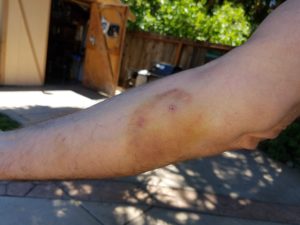Piccuta Law Group Files Police Brutality Lawsuit Against City of Concord for Disabled Senior Citizen Tasered During Traffic Stop
Piccuta Law Group has filed a new police brutality lawsuit alleging excessive force against the City of Concord and one of its police officers. The civil rights lawsuit was filed on behalf of a sixty-six-year-old medically disabled man. The lawsuit names officer Shaun Parsley as a defendant and claims that Parsley used excessive force when he tasered the senior citizen after an alleged traffic violation. The lawsuit was filed in Contra Costa County Superior Court and is entitled Smith v. City of Concord and Shaun Parsley (Case #: C20 -01316). The case was assigned to the Honorable Edward Weil.
Facts Alleged in the Police Brutality Lawsuit Against the City of Concord
On the night of June 15, 2019, the client entered the parking lot of the 7-Eleven located at 1096 Oak Grove Rd. in Concord, California. He then pulled into a parking spot directly in front of the building, exited his vehicle and began walking toward the door of the 7-Eleven. For reasons unknown to the client at the time, police officer Parsley followed him into the parking lot and activated his police cruiser’s lights.

Next, police officer Parsley exited his vehicle, confronted the client and commanded the client to get back into his car. The client asked the officer why he was ordering him to get back into his vehicle. The client also questioned the officer as to what he had done wrong. The officer responded by moving aggressively toward the client and screaming at him to get onto the ground. At this time, the client was in a narrow space between his own car and another parked vehicle. The client then moved out of the opening to a spot directly behind his car for safety. Once there, he voluntarily positioned himself onto his hands and knees.
The officer then approached the client, who was on the ground on all fours, and immediately began pushing him toward the pavement and delivering knee strikes to his ribs. The client dropped from his hands and knees down to his stomach. Then, without warning or justification, the officer deployed his Taser in dart mode. The darts struck the client in his lower back and right forearm. The officer cycled the Taser twice, causing the client to go limp. During the encounter, the police officer also stepped on the client’s left arm, put his knee on the client’s neck and drove the client’s face into the asphalt. While on the ground, the client attempted to comply at all times with the commands given by the police officer. Further, the client offered no resistance at any time. No criminal charges were ever brought against the client with respect to the incident.
The Injuries Suffered by the Client Due to the Police Brutality
The client suffered several injuries as a result of the excessive force used by the police officer. The client required emergency medical care and was transported by ambulance to the emergency room. At the emergency room he was treated for his wounds and injuries.
More specifically, the client sustained puncture wounds to his back and arm from the Taser. The client also suffered cuts, scrapes, bruises and other trauma-related injuries to his arms, knees, right shoulder, face, eye, ribs and orbital bone. The client continues to suffer symptoms consistent with PTSD as a result of the incident.



The client endured physical pain, mental suffering, loss of enjoyment of life, disfigurement, physical impairment, inconvenience, grief, anxiety, humiliation and emotional distress as a result of the incident. The client suffered a shoulder injury during the attack that required physical therapy and continues to be an ongoing problem. The client also required treatment from a psychiatrist to help him cope with the attack.
The Police Brutality Claims Advanced by Our Civil Rights Lawyers
The civil rights lawyers advanced three claims against the City of Concord and its police officer. Those claims are for: 1) Violation of the Bane Act (California Civil Code Sec. 52.1); 2) Battery by a Peace Officer and 3) Intentional Infliction of Emotional Distress.
The Bane Act is often referred to as California’s civil rights statute. It is similar to the federal statute 42 U.S.C. § 1983 in that it allows individuals to pursue claims against state and local government actors for violations of their civil rights. This includes police officers, local law enforcement, state probation officers, California Highway Patrol officers, county Sheriffs and their deputies as well as any other state or county employees.
The Bane Act is a state law, whereas 42 U.S.C. § 1983 is a federal law. As such, a claim advanced under § 1983 is a federal claim and a claim advanced under the Bane Act is a state law claim. Both statutes allow individuals to pursue claims when their civil rights are violated. Every individual has certain civil rights that should never be violated. These civil rights are set forth under the United States Constitution and the Amendments to it. These civil rights are further protected by the Constitution for the State of California.
Our attorneys claimed that the civil rights of the Client were violated. This includes the right to be free from excessive force under the Fourth Amendment. This also includes the right to exercise free speech and to be free from retaliation for doing so under the First Amendment. In this case, our civil rights attorneys alleged that the police officer retaliated against our client because the client questioned the officer. Specifically, the client asked the police officer why he was being ordered to get back in his vehicle and what he had done wrong.
What is First Amendment Retaliation?
In simple terms, First Amendment retaliation can be described as the improper suppression of free speech or expression by actions of a government official that would stop the average person from expressing him or herself or speaking freely. To win a First Amendment retaliation claim, a person must show that:
1) he or she engaged in constitutionally protected activity or speech; (2) the defendant or officer’s actions would chill a person of ordinary firmness from continuing to engage in the protected activity or speech; and (3) the protected activity or speech was a substantial motivating factor in the defendant or officer’s conduct—i.e., that there was a tie between the defendant or officer’s actions and an intent to chill the expression or speech.
Case law has established that individuals have the right to ask questions of law enforcement and police officers and even to be critical of them without being retaliated against. This includes questioning a law enforcement officer on a routine traffic stop.
Case law has established that individuals have the right to ask questions of law enforcement and police officers and even to be critical of them without being retaliated against. This includes questioning a law enforcement officer on a routine traffic stop. Unfortunately, untrained or hot-headed law enforcement officers wrongly view this as a challenge to their authority and escalate the situation into one where force is used.
In 2013, the Ninth Circuit Court of Appeals provided an instructive opinion in a case involving a motorist’s claim alleging First Amendment retaliation after the motorist was booked and jailed following a traffic stop. The case is entitled Ford v. City of Yakima (706 F.3d 1188 (2013)). In Ford, prior to the traffic stop, a police car had been following the motorist closely. While stopped at a traffic light, the motorist exited his car and asked the officer why he was following him so close. The officer felt “concerned for his safety” and told the motorist to get back in his vehicle and leave. After the parties drove through the intersection, the officer initiated a traffic stop of the motorist.
The motorist turned into a parking area and then exited his vehicle, yelling at the officer. The officer approached the motorist, armed with his taser, and asked the motorist for his license and registration. The officer viewed the situation as “very dangerous.” As the motorist retrieved his license and registration, he stated that he believed the stop was racially motivated. The motorist was then warned to stay in his vehicle or risk going to jail. The motorist said nothing further.
The court stated that “[t]he First Amendment protects a significant amount of verbal criticism and challenges directed at police officers.” Further, “[w]hile an individual’s critical comments may be provocative and challenging, they are nevertheless protected against censorship or punishment, unless shown likely to produce a clear and present danger of a serious substantive evil that rises far above public inconvenience, annoyance, or unrest.” Further, “[t]he freedom of individuals verbally to oppose or challenge police action without thereby risking arrest is one of the principal characteristics by which we distinguish a free nation from a police state.”
The freedom of individuals verbally to oppose or challenge police action without thereby risking arrest is one of the principal characteristics by which we distinguish a free nation from a police state.
In Ford, the court ultimately held that the motorist set forth facts sufficient to show a violation of his “clearly established First Amendment right to be free from police force action motivated by retaliatory animus, even if probable cause existed for that action.”
Contact an Experienced Civil Rights Law Firm and Hire a Skilled Police Brutality Lawyer
Contact us today if you or a loved one has been the victim of police brutality or has experienced a civil rights violation by law enforcement. Our civil rights lawyers have extensive experience handling civil rights cases across all of California and Arizona. We have repeatedly obtained high settlements and verdicts in cases involving police brutality. We have obtained civil rights verdicts in both state and federal court. A consultation is free and you pay nothing unless we obtain a recovery for you. Our firm advances all costs and there is no retainer that must be paid to proceed with your case. One of our civil rights lawyers is available now to discuss your case.
About the author: The content on this page was written by California civil rights lawyer and Monterey personal injury attorney Charles “Tony” Piccuta. Piccuta graduated with honors from Indiana University-Maurer School of Law in Bloomington, Indiana (Ranked Top 35 US News & World Report 2018). Piccuta took and passed the State bars of Arizona, California, Illinois and Nevada (all on the first try). He actively practices throughout California and Arizona. He is a winning trial attorney that regularly handles serious personal injury cases and civil rights lawsuits. He has obtained six and seven figure verdicts in both state and federal court. He has been recognized by Super Lawyers for six years straight. He is AV Rated by Martindale Hubble. He is a member of the Consumer Attorneys of California, American Association for Justice, National Police Accountability Project, Arizona Association of Justice, Maricopa County Bar Association and Scottsdale Bar Association, among other organizations.
Disclaimer: The information on this web site is for informational purposes only and does not constitute legal advice. Reading and relying upon the content on this page does not create an attorney-client relationship. If you are seeking legal advice, you should contact our law firm for a free consultation and to discuss your specific case and issues.
References:
[1]http://leginfo.legislature.ca.gov/faces/codes_displaySection.xhtml?lawCode=CIV§ionNum=52.1.

